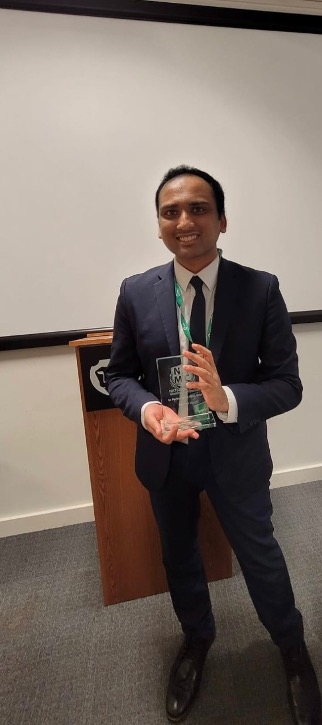Udit Mahalingam, a GDL student at City, University of London, was the runner-up at the 2022/23 National Speed Mooting Competition. The competition was held this year in Manchester at BPP Law School on April 1st, 2023. Here, Udit recounts his experiences preparing for the moot and participating in the event…

2023 saw the return of the National Speed Mooting Competition, a flagship event allowing law students to compete in a realistic, fast-paced mooting competition. Unlike most other moots, where participants are given an extended period time to digest the relevant case facts and authorities, the National Speed Moot aims to simulate the realities of practice at the Bar. Competitors receive the moot problem the night before the competition and have less than a day to prepare. 128 participants from across the country are judged by practising barristers, solicitors, and judges and compete in seven rounds in a single day. These consist of four knock-out rounds, followed by the quarterfinals, semi-finals, and finals.
The idea of participating in a moot as intense and fast-paced as this was daunting at first blush. Having previously progressed to the semi-finals of the Gray’s Inn Mooting Competition, I had grown accustomed to having ample amounts of time between rounds to craft and refine arguments. Nonetheless, however nerve-wracking the task was, I recognised how useful the competition could be in relation to the development of my oral advocacy skills. The central mission of the National Speed Moot is to provide students with insight into the inexorable facets of practical legal advocacy. Such facets include the ability to separate the material issues in a case from the immaterial, as well as quick-thinking, flexibility and adaptability in the face of strict time constraints. These skills are particularly relevant in the context of courtroom advocacy, where it is not uncommon for barristers to be briefed less than one day – or in some extreme cases, one hour – before a hearing.
And so, at exactly 3pm on March 31st, I received an email from the organisers of the competition containing information about the venue, the time of the first round (a prompt 9am start, no less), and – most importantly – the moot problem. Resigning myself to the fact that I had a 4pm tutorial standing between me and the problem, I decided to dive into the case facts and authorities during my train journey from Euston. The moot problem raised complex questions surrounding the admissibility of bad character evidence, the statutory gateways available under the Criminal Justice Act 2003, and the defences in the Modern Slavery Act 2015. Although I recognised resonances of the case with ongoing debates about child criminal exploitation in the context of drug trafficking, I had little familiarity with the substantive aspects of the problem and so set about researching the broader issues at play. Having determined that I had a grasp of the salient legal points, I drafted some brief speaking notes arguing the appellant and respondent’s case before making my way to my accommodation for the night.
The next morning, after sleepily exploring the streets of Manchester’s Northern Quarter, I arrived at the St James Building, where I had the opportunity to interact with many of the other participants in the competition. I met individuals from various walks of life, and at different stages of their legal journeys (ranging from first-year students to legal academics!). Whilst progressing through each knock-out round, it was heartening to not only get on my feet and argue my case, but to interact with the judges and discuss their various pathways into the law. Incorporating their feedback into my submissions in subsequent rounds contributed to the palpable feeling that the quality of my advocacy was improving over the course of the day. Between rounds, I was able to observe snippets of a mock criminal trial, prosecuted by Gerard Rogerson, a Crown Advocate at the Crown Prosecution Service, and defended by Kristina Goodwin, a barrister at St Paul’s Chambers. I was also able to catch up with the other participants over lunch before attending a talk involving a panel of civil and criminal practitioners, each of whom shared their unique insights about life at the Bar.

After making it through to the quarterfinals, it became clear that the stakes were increasing. During the knockouts, participants were given seven minutes to make their submissions and judges were instructed to limit the number of interventions they raised. However, from the semi-finals onwards, there was no limit on the questions that judges could raise, and participants were now given ten minutes to make their submissions. The organisers of the competition were incredibly accommodating at this stage of the competition and gave us time to rest, recuperate, and amend our submissions to factor in the increase in time and the prospect of additional interventions.
Upon reaching the final, I was faced with a panel of seven judges, each of whom subjected me and my opponent, Beatrice Munro, to exacting interventions. Despite being free to leave, several of the other participants stayed behind to lend their support and silent encouragement. Eventually, after a period of deliberation, the panel of judges announced that Beatrice had (deservedly) won the competition, but that the decision had been a close one to call. It was encouraging to note that one of the judges, who had observed me earlier in the knock-out rounds, commented on the marked improvement in the quality of my submissions.
I left Manchester with a smile on my face, having made firm friends and gained confidence in my advocacy abilities over the course of the day. Participating in the National Speed Moot would not have been possible without the support of certain individuals. I would like to thank John Dove, his family, and the organisers at BPP Law School for coordinating and organising the event, as well as the other competitors for providing a vital source of moral support. I would also like to thank Emily Allbon and the rest of the team at City for their dedication to ensuring that students, such as myself, are well-placed to take part in moots such as this. The advice and training provided by City over the course of this year played an invaluable role in my success in this competition.

